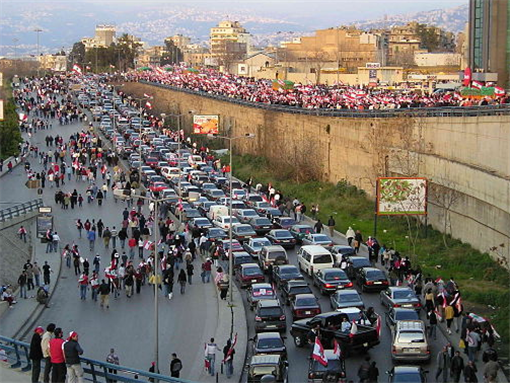This themed issue of the Arab Studies Journal reflects a shift in scholarship that conceives of “space” as a category of critical analysis and a fertile terrain for fluid dynamics central to changing social, cultural, and political contexts. These new conceptions of space represent some of the ways that scholars of the Middle East and North Africa are building upon generations of academic work to further challenge the reductive histories and myopic frameworks that have characterized Orientalist scholarship.
The four articles in this issue analyze space from four different disciplines: history, literary and cultural studies, political science, and anthropology. John Chalcraft employs an innovative ethnographic approach to explore the enduring subaltern status of Syrian migrant workers in Lebanon, who have been relegated to the shadowy spaces at the bottom of Lebanon’s economy. Carla Daughtry considers southern Sudanese asylum seekers in Cairo in the context of transnational globalization theory, and the relationship between space, place and identity. Sune Haugbolle analyzes the politicization of space in downtown Beirut during the “Cedar Revolution” by focusing on the anti-Syrian opposition’s use of this public space and the centrality of public disputation, validation, and consensus. Finally, Dina Amin reveals how the rise of colonialism and Western theatrical conceptions in Egypt silenced spectators and severely limited audience participation, and how the performance space was subsequently reshaped within the context of Egyptian nationalism and anti-colonialism.
This issue also includes eleven reviews and review essays dealing with recent scholarship on space, including spatial histories, the construction of modern nation-states, the changing nature of cities in the Middle East, and the role of architecture and city planning in shaping spaces of occupation. This special section concludes with a review and close analysis of the first issue of Makan, a journal published by Adalah – The Legal Center for Arab Minority Rights in Israel. An additional review section in this issue includes analyses of scholarly and artistic work across a number of disciplines.
Content:
Articles
Subalternity, Material Practices, and Popular Aspirations: Syrian Migrant Workers in Lebanon
by John Chalcraft
Conflict and Community in Church-Based Refugee Havens in Cairo: The Quest for Space to be Dinka
by Carla N. Daughtry
Spatial Transformations in the Lebanese “Independence Intifada”
by Sune Haugbolle
Egyptian Theater: Reconstructing Performance Spaces
by Dina Amin
Book Reviews on Space
Reclaiming a Plundered Past: Archaeology and Nation Building in Modern Iraq
by Magnus T. Bernhardsson
reviewed by Zainab Bahrani
Planning Middle Eastern Cities: An Urban Kaleidoscope in a Globalizing World
by Yasser Elsheshtawy
reviewed by Ali A. Alraouf
Remaking the Modern: Space, Relocation, and the Politics of Identity in a Global Cairo
by Farha Ghannam
reviewed by Mara Naaman
Fin de Siecle Beirut: The Making of an Ottoman Provincial Capital
by Jens Hanssen
reviewed by Nadya Sbaiti
Spaces of Global Capitalism: Towards a Theory of Uneven Geographical Development
by David Harvey
reviewed by Nicholas De Genova
Jordanian Jerusalem: Holy Places and National Spaces
by Kimberly Katz
reviewed by Elena Corbett
Overthrowing Geography: Jaffa, Tel Aviv, and the Struggle for Palestine, 1880-1948
by Mark Le Vine
reviewed by Andrea Stanton
A Civilian Occupation: The Politics of Israeli Architecture
Edited by Rafi Segal
reviewed by Yosef Jabareen
Possessors and Possessed: Museums, Archaeology, and the Visualization of History in the Late Ottoman Empire
by Wendy M. K. Shaw
reviewed by James E. Baldwin
The Image of an Ottoman City: Imperial Architecture and Urban Experiences in Aleppo in the 16th and 17th Centuries
by Heghnar Zeitlian Watenpaugh
reviewed by Alan Mikhail
Makan: The Right to the City and New Ways of Understanding Space
Edited by Suad Bishara
reviewed by Ozlem Altan
Book Reviews
Rethinking the Late Ottoman Empire: A Comparative Social and Political History of Albania and Yemen, 1878-1918
by Issa Blumi
reviewed by Alexis Wick
Unfortunately, It Was Paradise: Selected Poems
by Mahmoud Darwish
reviewed by Robert Creswell
Markets of Dispossession: NGOs, Economic Development, and the State in Cairo
by Julia Elyachar
reviewed by Koray Caliskan
Re-Envisioning Egypt, 1919-1952
Edited by Arthur Goldschmidt
reviewed by Jennifer Derr
Modern Egyptian Art, 1910-2003
by Liliane Karnouk
reviewed by Dina Ramadan
Civil and Uncivil Violence in Lebanon: A History of the Internationalization of Communal Conflict
by Samir Khalaf
reviewed by Raja Abillama
Good Muslim, Bad Muslim: America, the Cold War, and the Roots of Terror
by Mahmood Mamdani
reviewed by Marwan Dalal
The Persistence of the Palestinian Question: Essays on Zionism and the Palestinians
by Joseph A. Massad
reviewed by Laleh Khalili
The Transmission of Learning in Islamic Africa
Edited by Scott S. Reese
reviewed by Paul E. Lovejoy
The Novel and the Rural Imaginary in Egypt, 1880-1985
by Samah Selim
reviewed by Yasmine Ramadan
The One-State Solution: A Breakthrough for Peace in the Israeli-Palestinian Deadlock
by Virginia Tilley
reviewed by Issa Mikel
Being Modern in the Middle East: Revolution, Nationalism, Colonialism, and the Arab Middle Class
by Keith David Watenpaugh
reviewed by Sherene Seikaly
Palestinian Theater
by Reuven Snir
reviewed by Jordan Sudermann
Review Essay
The New State of Poetics
by Anthony Alessandrini
Exhibition Review
Haunting Preconceptions
by Sarah Rogers
Film Review
Crossing Boundaries Through Film and Dark (Safe) Spaces
by Maysoun Freij












